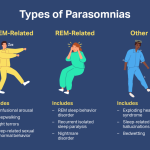When it comes to getting a good night’s sleep, many people turn to sleep aids for help. One popular question that often arises in sleep-related discussions is, “Is trazodone a sleeping pill?” Well, my friend, let’s dive into this topic and unravel the mysteries of trazodone as a sleep aid.
Now, before we dig deeper, let’s clarify something. Trazodone is primarily an antidepressant medication. However, it is sometimes prescribed off-label to treat insomnia and promote better sleep. So, while it’s not technically a sleeping pill in the traditional sense, it can indeed help you catch those elusive Zzzs. But how does it work its magic? Well, trazodone affects the levels of certain chemicals in the brain, such as serotonin, which plays a crucial role in regulating sleep. By altering these chemical levels, trazodone can promote drowsiness and aid in falling asleep. However, it’s important to note that trazodone should only be taken under the guidance of a healthcare professional, as they can determine the right dosage and monitor its effects on your sleep patterns.
In conclusion, while trazodone is not classified as a sleeping pill, it can be used to improve sleep quality and combat insomnia. Remember to consult with your doctor before starting any new medication, as they will provide the best guidance based on your individual needs. So, if you’ve been wondering if trazodone could be the solution to your sleep troubles, it’s worth having a conversation with your healthcare provider to explore this option further. Sleep tight!

Is Trazodone a Sleeping Pill?
Trazodone is a medication primarily used to treat depression. However, it is also commonly prescribed off-label for its sedative effects, which can help with sleep disorders such as insomnia. Many people wonder if trazodone can be considered a sleeping pill due to its ability to induce drowsiness. In this article, we will explore the use of trazodone as a sleep aid and discuss its effectiveness, potential side effects, and other important considerations.
What is Trazodone?
Trazodone is an antidepressant medication that belongs to a class of drugs known as serotonin modulators. It works by increasing the levels of serotonin, a neurotransmitter that plays a role in regulating mood, in the brain. Trazodone is commonly prescribed to treat major depressive disorder, anxiety disorders, and insomnia.
Trazodone is available in tablet form and is usually taken orally. The dosage and frequency of administration will depend on the individual’s condition and response to the medication. It is important to follow the prescribed dosage and consult with a healthcare professional before making any changes.
Using Trazodone as a Sleep Aid
While trazodone is primarily used to treat depression, it is often prescribed off-label as a sleep aid. The sedative effects of trazodone make it useful for managing sleep disorders such as insomnia. When used for this purpose, trazodone is typically taken at bedtime to help induce sleep and improve sleep quality.
When considering trazodone as a sleep aid, it is important to note that it is not approved by the FDA specifically for this purpose. However, healthcare providers may prescribe it off-label based on their clinical judgment and the individual’s specific needs. It is essential to follow the healthcare provider’s instructions and dosage recommendations when using trazodone as a sleep aid.
Effectiveness of Trazodone as a Sleep Aid
The effectiveness of trazodone as a sleep aid can vary from person to person. Some individuals may find that it helps them fall asleep faster and stay asleep throughout the night, while others may not experience the same benefits. It is important to remember that everyone’s response to medication can differ, and what works for one person may not work for another.
In clinical studies, trazodone has been shown to improve sleep quality and reduce sleep latency (the time it takes to fall asleep) in individuals with insomnia. However, more research is needed to fully understand its effectiveness as a sleep aid. It is recommended to discuss the potential benefits and risks of using trazodone for sleep with a healthcare professional.
Potential Side Effects of Trazodone
Like any medication, trazodone can cause side effects. Common side effects include drowsiness, dizziness, dry mouth, blurred vision, and constipation. These side effects are usually mild and may improve over time as the body adjusts to the medication. However, if these side effects persist or worsen, it is important to contact a healthcare professional.
In rare cases, trazodone can cause more serious side effects such as changes in heart rhythm, priapism (persistent and painful erection), and serotonin syndrome (a potentially life-threatening condition). It is crucial to seek immediate medical attention if any severe side effects occur.
Considerations When Using Trazodone as a Sleep Aid
Before using trazodone as a sleep aid, it is essential to discuss it with a healthcare professional. They will evaluate your medical history, current medications, and individual needs to determine if trazodone is a suitable option for you. It is important to disclose any pre-existing medical conditions or allergies to ensure safe and effective use of the medication.
Additionally, trazodone should not be combined with other sedatives, alcohol, or drugs that can cause drowsiness, as it can increase the risk of side effects. It is also important to follow the prescribed dosage and avoid sudden discontinuation of the medication, as it can lead to withdrawal symptoms.
In conclusion, while trazodone is primarily used to treat depression, it is often prescribed off-label as a sleep aid due to its sedative effects. It can help with sleep disorders such as insomnia by inducing drowsiness and improving sleep quality. However, its effectiveness can vary from person to person, and it is important to consider potential side effects and consult with a healthcare professional before using trazodone as a sleep aid.
Key Takeaways: Is Trazodone a Sleeping Pill?
- Trazodone is a medication primarily used to treat depression, but it is also prescribed as a sleep aid.
- It can help with sleep problems such as insomnia by increasing the levels of certain brain chemicals that promote sleep.
- Trazodone is generally safe for short-term use, but it may cause side effects like drowsiness, dizziness, and dry mouth.
- It is important to follow the prescribed dosage and avoid alcohol or other sedatives while taking trazodone.
- Talk to a healthcare professional to determine if trazodone is a suitable sleep aid option for you.
Frequently Asked Questions
Here are some commonly asked questions about trazodone as a sleeping pill:
1. Can trazodone be used as a sleeping pill?
Yes, trazodone can be used as a sleeping pill. While it is primarily an antidepressant medication, it also has sedative properties that make it effective for treating insomnia. Trazodone helps to promote sleep by increasing the levels of certain chemicals in the brain that are responsible for regulating sleep-wake cycles.
It is important to note that trazodone is usually prescribed at lower doses for insomnia compared to its higher doses for depression. Your doctor will determine the appropriate dosage for your specific sleep concerns. It is always recommended to follow your doctor’s instructions and never exceed the prescribed dosage.
2. How does trazodone work as a sleeping pill?
Trazodone works as a sleeping pill by affecting the levels of certain neurotransmitters in the brain, such as serotonin. It acts as a serotonin antagonist and reuptake inhibitor, which means it blocks the reabsorption of serotonin and increases its availability in the brain.
Increased serotonin levels promote feelings of relaxation and drowsiness, making it easier to fall asleep and stay asleep throughout the night. Trazodone also has antihistamine properties, which contribute to its sedative effects. However, the exact mechanism of action of trazodone in treating insomnia is not fully understood.
3. Are there any side effects of using trazodone as a sleeping pill?
Like any medication, trazodone can cause side effects when used as a sleeping pill. Common side effects include drowsiness, dizziness, dry mouth, and blurred vision. These side effects are usually mild and temporary, but if they persist or worsen, it is important to consult your doctor.
Less common but more serious side effects of trazodone may include changes in heart rhythm, low blood pressure, and priapism (prolonged and painful erection). If you experience any of these side effects, seek medical attention immediately. It is also important to inform your doctor about any other medications you are taking to avoid potential drug interactions.
4. Is trazodone safe for long-term use as a sleeping pill?
Trazodone is generally safe for short-term and long-term use as a sleeping pill. However, it is important to regularly evaluate the effectiveness of the medication and discuss with your doctor if any adjustments are needed. Long-term use of trazodone may lead to tolerance, where the medication becomes less effective over time.
Your doctor may recommend periodic breaks from trazodone or suggest alternative treatments if tolerance develops. It is also important to follow your doctor’s instructions regarding the duration of treatment and to gradually taper off the medication when discontinuing its use.
5. Can trazodone be used by everyone as a sleeping pill?
Trazodone may not be suitable for everyone as a sleeping pill. It is important to inform your doctor about any pre-existing medical conditions, such as liver or kidney disease, as well as any other medications you are taking. Trazodone may interact with certain medications, including other antidepressants, antihistamines, and blood pressure medications.
Additionally, trazodone should be used with caution in older adults, as they may be more sensitive to its sedative effects. Your doctor will consider these factors and assess whether trazodone is a suitable and safe option for your specific sleep concerns.
TRAZODONE FOR INSOMNIA | Learn the Side Effects and What to Expect
Final Summary: Is Trazodone a Sleeping Pill?
So, is trazodone a sleeping pill? The answer is yes, but it’s not as simple as that. Trazodone is primarily an antidepressant medication that is sometimes prescribed off-label for its sedative effects. It can help with insomnia and improve sleep quality, but it’s important to understand that it’s not specifically designed as a sleep aid.
In conclusion, while trazodone can be effective in promoting sleep, it should be used under the guidance of a healthcare professional. It’s crucial to discuss your specific sleep concerns and medical history with your doctor to determine if trazodone is the right choice for you. Remember, there are various other options available for managing sleep difficulties, so exploring alternative treatments or lifestyle changes may also be beneficial. Take control of your sleep health and consult with your healthcare provider for personalized advice and recommendations. Sleep tight!


